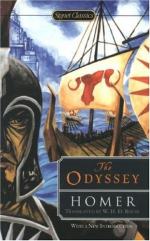Having thus given a brief account of the poems comprised in Pope’s design, I will now proceed to make a few remarks on his translation, and on my own purpose in the present edition.
Pope was not a Grecian. His whole education had been irregular, and his earliest acquaintance with the poet was through the version of Ogilby. It is not too much to say that his whole work bears the impress of a disposition to be satisfied with the general sense, rather than to dive deeply into the minute and delicate features of language. Hence his whole work is to be looked upon rather as an elegant paraphrase than a translation. There are, to be sure, certain conventional anecdotes, which prove that Pope consulted various friends, whose classical attainments were sounder than his own, during the undertaking; but it is probable that these examinations were the result rather of the contradictory versions already existing, than of a desire to make a perfect transcript of the original. And in those days, what is called literal translation was less cultivated than at present. If something like the general sense could be decorated with the easy gracefulness of a practised poet; if the charms of metrical cadence and a pleasing fluency could be made consistent with a fair interpretation of the poet’s meaning, his words were less jealously sought for, and those who could read so good a poem as Pope’s Iliad had fair reason to be satisfied.
It would be absurd, therefore, to test Pope’s translation by our own advancing knowledge of the original text. We must be content to look at it as a most delightful work in itself,—a work which is as much a part of English literature as Homer himself is of Greek. We must not be torn from our kindly associations with the old Iliad, that once was our most cherished companion, or our most looked-for prize, merely because Buttmann, Loewe, and Liddell have made us so much more accurate as to amphikipellon being an adjective, and not a substantive. Far be it from us to defend the faults of Pope, especially when we think of Chapman’s fine, bold, rough old English;—far be it from us to hold up his translation as what a translation of Homer might be. But we can still dismiss Pope’s Iliad to the hands of our readers, with the consciousness that they must have read a very great number of books before they have read its fellow.
TheodoreALOIS Buckley.
Christ Church.
THE ODYSSEY OF HOMER
BOOK I
Argument.
Minerva’s descent to Ithaca.




